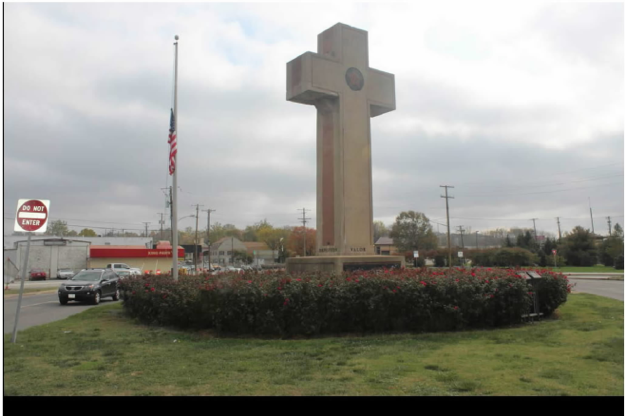Christian Nationalism and the Bladensburg Cross
Asked whether the United States is a Christian nation, about half of Americans surveyed answer yes. The conclusion that America is a Christian nation is not necessarily descriptive but aspirational: over half of Americans believe that being Christian is either “very” or “somewhat” important to being a good American.
This link between Christianity and American citizenship is an aspect of Christian nationalism—the notion that the United States has always been, and should always remain, a Christian nation in both its culture and government. Christian nationalists believe that the United States has a special relationship with God, and that a failure to obey God’s laws as they understand it will lead to great national harm. Consequently, Christian nationalism leads many adherents to demand a Christian government to ensure that the United States abides by Christian principles. In evaluating how closely people align with Christian nationalism, sociologists measure their level of agreement with statements such as “the federal government should advocate Christian values,” “the federal government should declare the United States a Christian nation,” and “the federal government should allow the display of religious symbols in public spaces.”
As these statements suggest, furthering Christian nationalism also furthers a religious hierarchy: If a true America is Christian, it follows that true Americans are Christian. The corollary is that non-Christians are not real Americans. In short, the ideology of Christian nationalism implies a caste system based on religion, with religious insiders who truly belong and religious outsiders who do not.
Consistent with this conclusion, sociologists have found that Americans who strongly identify with Christian nationalism have more hostile attitudes towards outgroups, religious and otherwise. Thus, in addition to antagonism towards non-Christians, studies show that Christian nationalists exhibit antagonism towards outgroups such as LGBT couples, racial minorities, and immigrants. That hostility paves the way for hostile public policy, whether allowing foster care agencies to discriminate against non-Christiansor implementing a Muslim ban. Christian nationalism does not simply lead to symbolic exclusion from the community and nation: it may lead to actual, de jure exclusion.
Even if only inadvertently, government-sponsored Christianity, such as the forty-foot Bladensburg cross, can both reflect and contribute to Christian nationalism. The Bladensburg cross, which stands in the meridian of a busy highway in the suburbs of Washington D.C., was erected as a World War I Veterans Memorial in 1925—an era much less mindful of the rights of minorities. The U.S. Supreme Court recently heard arguments about whether the cross violates the Establishment Clause.

Whatever else it may be, a monumental Latin cross in the middle of the public highway is—at bare minimum—consistent with Christian nationalism and its creed of government identification with and promotion of Christianity.
Nonetheless, the Supreme Court seems poised to let the Bladensburg cross stand. This would be a mistake of constitutional dimension. At the same time the government monument honors Christians who died for the United States, the cross represents a union between Christianity and American citizenship, a union spelled out on its plaque, which announces “our motto, ‘one god, one country, and one flag.’” Even if not specifically motivated by Christian nationalism, the government’s Latin cross monument still advances, or suggests sympathy for, a Christian nationalist ideology (and will be reasonably seen by many as doing so).
Despite the doctrinal confusion surrounding the Establishment Clauseit is generally accepted that the Establishment Clause forbids the government from privileging one religion over others or making its adherents favored members of the polity. In other words, one of the core goals of the Establishment Clause is to stave off developments like Christian nationalism and its hierarchies of citizens. Given that the Bladensburg cross reflects and strengthens this troubling strain in American society, it should be held unconstitutional.
(This Essay provides more detail on Christian nationalism and the Establishment Clause.)
